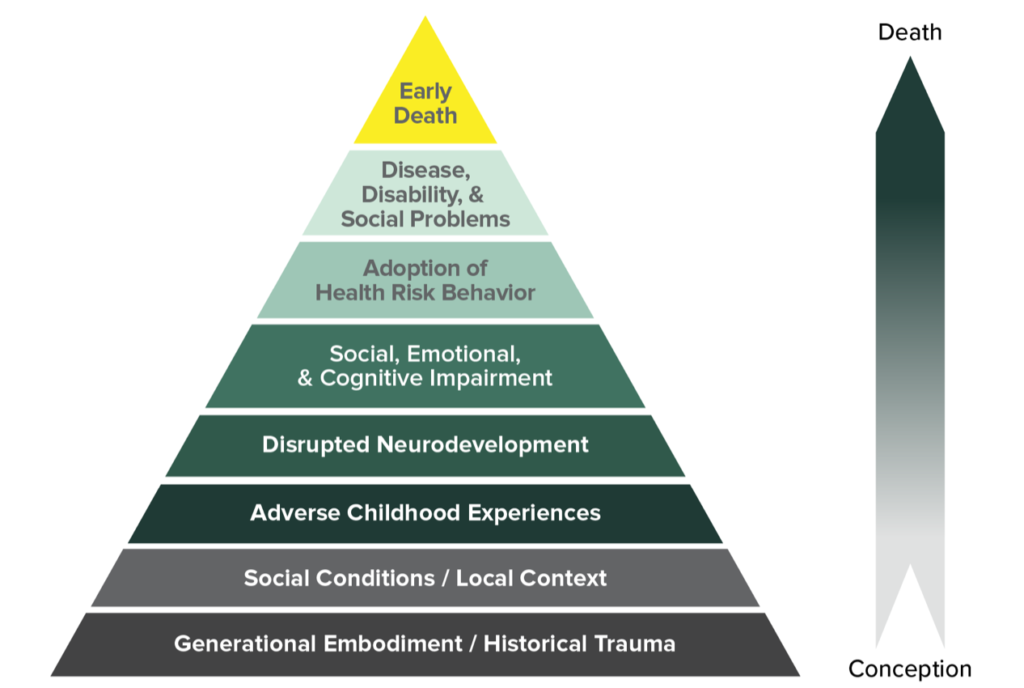As a society — how do we really understand the impact of trauma?
Just as positive experiences and our ability to deal with them can set us up for successful lives, childhood and adult trauma, in the absence of adequate protective factors, can devastate lives. But as we know more about how people cope effectively with stressful events in their lives, we can help people heal. From our extensive trauma-related research, we now recognize that unaddressed trauma is the hidden cause of most preventable illnesses, and is associated with eight of the 10 leading causes of death, including heart, lung and kidney disease, cancer, stroke, diabetes, suicide, and accidental overdose. When we fail to address the trauma that underlies these diseases, prevention and treatment is far less effective, and in some cases, not effective at all.

Trauma Defined
“Trauma is an event, series of events, or set of circumstances that is experienced by an individual as physically or emotionally harmful or threatening and that has lasting adverse effects,” according to the federal Substance Abuse and Mental Health Services Administration.
Traumatic events include:
- Individual: childhood and adult physical, sexual, and emotional abuse or neglect
- Family: parental loss, incarceration, mental illness, substance use, and/or interpersonal violence
- Community: experiences of racism, xenophobia, and discrimination, witnessing violence, living in foster care
- Historical: slavery, genocide, colonization
Thankfully, the healthcare system is beginning to grasp the role trauma plays in chronic diseases. The system now recognizes the role it can play in either compounding the situation — by treating just the symptoms of disease — or providing trauma-informed care that leads to genuine healing. At the Center to Advance Trauma-informed Health Care, we are helping to lead a movement to transform the US health care system from treatment to healing by effectively addressing the traumatic roots of most illness, disability, and death.
How Trauma Begins—Adverse Childhood Experiences (ACEs)
A consensus of scientific research demonstrates that cumulative adversity, especially when experienced during critical and sensitive periods of development, is a root cause of some of the most harmful, persistent, and expensive health challenges facing our state and nation.
In a landmark 1998 study by the Centers for Disease Control and Prevention (CDC) and Kaiser Permanente, the term Adverse Childhood Experiences (ACEs) emerged to describe 10 categories of adversities in three domains experienced by age 18:
- Abuse: physical, emotional, or sexual
- Neglect: physical or emotional
- Household challenges: growing up with household incarceration, mental illness, substance dependence, parental separation or divorce, or intimate partner violence
ACEs, without adequate buffering factors such as the presence of a highly attentive parent or adult, can cause “toxic stress,” a type of stress that is so severe or prolonged, that it has lasting, damaging impacts on the body and mind that are detectable as early as infancy.
Key Research Findings About Adverse Childhood Experiences
Among the US population as a whole, people with four or more ACEs are:
- 1.4x as likely to have diabetes
- 2 to 2.3x as likely to have a stroke, cancer, or heart disease
- 3x more likely to smoke cigarettes
- 3.2x as likely to have chronic lower respiratory disease
- 5x more likely to have major depression
- 10x more likely to experience “problematic drug use”
- 37.5x as likely to attempt suicide
Manifestations of Trauma Can Occur as Early as Infancy
In babies, high doses of adversity are associated with failure to thrive, growth delay, sleep disruption, and developmental delay.
School-aged children may have increased risk of viral infections, pneumonia, asthma and other atopic diseases, as well as difficulties with learning and forming healthy and stable relationships. Among adolescents with high ACEs, somatic complaints—including headache and abdominal pain, increased engagement in high-risk behaviors, teen pregnancy, teen paternity, sexually transmitted infections (STIs), mental health disorders, and substance misuse—are common.
Trauma in Adulthood
Trauma in adulthood is also common and linked with many of the same physical and psychological illnesses as childhood trauma. More than one-third of women in America experience stalking, physical violence, and/or rape from intimate partner violence (IPV) during their lifetime. Both adult woman and men can experience trauma from chronic illnesses, physical accidents, death of loved ones, interpersonal violence, emotional abuse, financial hardships and more.
Not Addressing Trauma is Incredibly Costly
According to the CDC, preventing ACEs could potentially reduce a large number of health conditions. For example, up to 1.9 million cases of heart disease and 21 million cases of depression could be potentially avoided by preventing ACEs.
And Adverse Childhood Experiences are costly. The economic and social costs to families, communities, and society totals hundreds of billions of dollars each year.
Our Vision: Trauma-informed Health Care
Learn more about CTHC’s efforts to transform the quality of healthcare and help families heal.

